Iran | 28.05.2008
Criticism of Iran Flares Over Alleged Nuclear Secrets
The United Nations nuclear watchdog has accused Iran of conducting secret studies to develop nuclear weapons capabilities. The UN agency sharpened its critical tone ahead of a key meeting next week.
Criticism of Iran sharpened Tuesday, May 27 after the United Nation's International Atomic Energy Agency (IAEA) released a report that accused Iran of withholding information. Germany said the report showed that the international community must push for a faster response from Tehran.
The IAEA report makes it clear that Iran "is still not demonstrating the spirit of cooperation,"
German Foreign Minister Frank-Walter Steinmeier complained.
"The ball is in the Iranians' court," Steinmeier said. "Either it is picked up there, and we're getting reasonable answers to our questions, or the entry into talks with the aim of a diplomatic solution to the conflict is further delayed. The alternative would then be an increase of international pressure, also through the UN Security Council."
Secret studies of "serious concern"
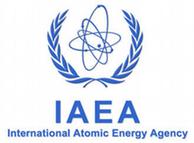 Bildunterschrift: Großansicht des Bildes mit der Bildunterschrift: The IAEA says Iran isn't cooperating
Bildunterschrift: Großansicht des Bildes mit der Bildunterschrift: The IAEA says Iran isn't cooperating
The alleged secret studies suggest Iran may have been trying to develop a nuclear warhead, convert uranium and test high explosives and a missile re-entry vehicle, according to the IAEA report, which was released late Monday.
Iran has repeatedly dismissed the existence of secret studies, calling the accusation "baseless" and the intelligence which Western governments site as showing the studies exist as "forged."
But the IAEA has demanded "substantive" evidence that it's nuclear aspirations are peaceful.
"The alleged studies...remain a matter of serious concern. Clarification of these is critical to an assessment of the nature of Iran's past and present nuclear program," the IAEA said in a statement.
The report said intelligence from a number of sources shows Iran has conducted the studies. It will be discussed by the IAEA's board of governors next week.
Iran refuses to stop enrichment
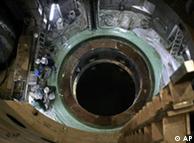 Bildunterschrift: Großansicht des Bildes mit der Bildunterschrift: Iran insists it does not plan to make nuclear weapons
Bildunterschrift: Großansicht des Bildes mit der Bildunterschrift: Iran insists it does not plan to make nuclear weapons
Iran has recently sped up its uranium enrichment, a process which can be used to make fissile material for an atomic bomb. Iran claims it wants enriched uranium to use for energy, not bombs. Iran has refused to change course, despite three rounds of UN sanctions.
"Substantive explanations are required from Iran to support its statements on the alleged studies and on other information with a possible military dimension," the report insisted.
The IAEA said it was continuing to "assess the information and explanations provided by Iran" but found them to be inadequate. The IAEA believes Iran may have additional information, particularly in the areas of high explosives testing and missiles, which it needs to share with the agency.
Enrichment is "peaceful"
For Iran, there's little that has been left unsaid.
"We have left no question unanswered. We have given all the explanations needed as far as we are concerned," Iran's ambassador Ali Asghar Soltanieh told the French news agency "AFP" in a telephone interview.
"We have given 200 pages of explanations" with regard to the so-called weaponization allegations, Soltanieh continued. "We have dealt with this in depth."
The Iranian envoy insisted the new report was "a vindication and reiteration of the peaceful nature of Iran's nuclear activities."
Iran will not back down on the matter and will not suspend enrichment, Soltanieh said. "We will continue enrichment, while not suspending our cooperation with the IAEA."
In all, Iran was operating about 3,500 uranium-enriching centrifuges at its main nuclear site in Natanz, the report said. Tehran has told the IAEA it hopes to nearly double that amount within the next few months. The agency believes the target is achievable, a senior official close to the Vienna-based watchdog told "AFP."
Iran accused of stonewalling
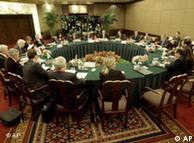 Bildunterschrift: Großansicht des Bildes mit der Bildunterschrift: Further high-stakes meetings on Iran's nuclear program will take place next week
Bildunterschrift: Großansicht des Bildes mit der Bildunterschrift: Further high-stakes meetings on Iran's nuclear program will take place next week
US and European officials said the IAEA report proves that Iran is continuing to stonewall the agency's long-running investigation into its atomic buildup.
"The report shows in great detail how much Iran needs to explain, and how little it has," said the US ambassador to the IAEA, Gregory Schulte.
The International Atomic Energy Agency is "clearly frustrated by Iran's stonewalling. They want answers," said Joe Cirincione, non-proliferation expert and head of the Washington-based Ploughshares Fund told "AFP."
Mark Fitzpatrick, non-proliferation expert at the International Institute for Strategic Studies in London, noted the unusually strong tone of the report.
It was "harder on Iran, both in the detail and in the tone," Fitzpatrick told "AFP."
Europe still hopeful of deal
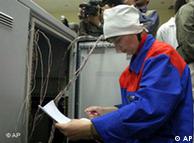 Bildunterschrift: Großansicht des Bildes mit der Bildunterschrift: Germany wants more pressure put on Iran
Bildunterschrift: Großansicht des Bildes mit der Bildunterschrift: Germany wants more pressure put on Iran
Germany belongs to the six-nation group negotiating with Iran, which also includes the permanent UN security council members Britain, China, France, Russia and the United States.
A German foreign ministry spokesman said Tuesday that Berlin and the five nations remained committed to negotiating a way of getting Iran to comply with security council demands to stop uranium enrichment and come clean about its nuclear activities.
Spokesman Martin Jaeger said he hoped an "improved and expanded" offer of incentives to Iran worked out by the six-nation group could be made "very soon."
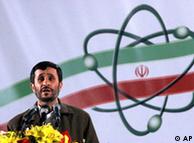
Comments